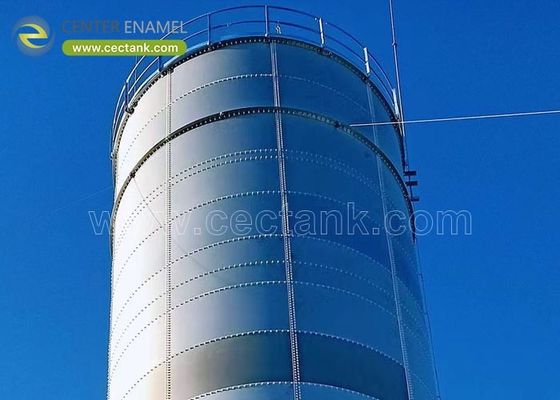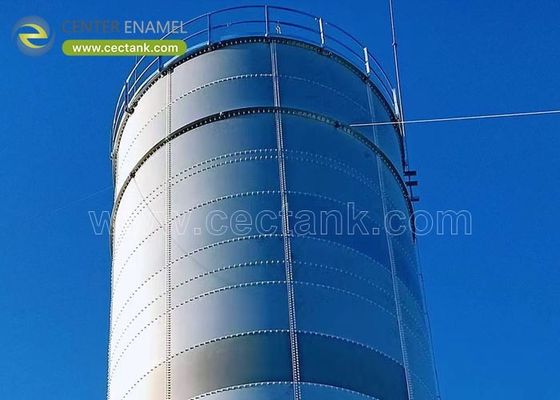-
Glass Fused To Steel Tanks (419)
-
Stainless Steel Tanks (410)
-
Fusion Bonded Epoxy Tanks (424)
-
Galvanized Steel Tanks (321)
-
Aluminum Dome Roofs (872)
-
Wastewater Storage Tanks (226)
-
Welded Steel Tanks (297)
-
Pressure Vessels (295)
-
Anaerobic Digester (201)
-
Industrial Water Tanks (349)
-
Glass Lined Steel Tanks (180)
-
Bolted Steel Tanks (181)
-
Sludge Storage Tank (115)
-
Biogas Storage Tank (173)
-
Leachate Storage Tanks (133)
-
Agricultural Water Storage Tanks (179)
-
Fire Water Tank (166)
-
Grain Storage Silos (130)
-
Biogas Projects (349)
-
Wastewater Treatment Projects (270)
-
Double Membrane Roof (223)
Stainless Steel Cattle Feed Silos: Elevating Feed Security, Hygiene, and Profitability
| Place of Origin: | China |
| Brand Name: | CEC TANKS |
| Certification: | ISO 9001:2008, AWWA D103 , OSHA , BSCI |
| Model Number: | W |
| Minimum Order Quantity: | 1set |
| Price: | $5000~$20000 one set |
| Packaging Details: | PE poly-foam between each two steel plates ; wooden pallet and wooden |
| Delivery Time: | 10-30 days after deposit received |
| Payment Terms: | L/C, T/T |
| Supply Ability: | 60 sets per month |
|
Detail Information |
|||
Product Description
Stainless Steel Cattle Feed Silos: Elevating Feed Security, Hygiene, and Profitability
Cattle feed storage is more than just a repository for pellets and roughage. It is a critical link in the supply chain that affects feed quality, livestock health, and farm profitability. Stainless steel cattle feed silos stand out as a premium solution for modern operations seeking durability, cleanliness, and long-term value. Center Enamel’s stainless steel silos combine corrosion resistance, robust construction, and thoughtful design to meet the diverse needs of dairy, beef, and mixed farms worldwide.
As a leading storage tank manufacturer worldwide. Center Enamel can provide Glass Lined Steel(GLS) tanks, fusion bonded epoxy tanks, stainless steel tanks, galvanized steel tanks and aluminum geodesic dome roofs, Wastewater and Biogas Project Equipments for global customers.
| Configuration of Customized Storage Tanks | ||||
| Storage tanks | Volume | Roofs | Application | Design Requirements |
|
GLS Tanks SS Tanks Fusion Bonded Epoxy Tanks Galvanized Steel Tanks Welded Steel Tanks |
<1000m³ 1000-10000m³ 10000-20000m³ 20000-25000m³ >25000m³ |
ADR Roof GLS Roof Membrane Roof FRP Roof Trough Deck Roof |
Wastewater Treatment Project Drinking Water Project Municipal Sewage Project Biogas Project Fire Water Storage Project Oil Storage Project |
Water Supply & Drainage System Seismic Design Wind Resistant Design Lightning Protection Design Tank Insulation Design |
WasteWater Treatment Project Equipment Supply
| Pretreatment Equipment | Resource Utilization System | Sludge Treatment System | Other Equipment |
|
Mechanical Bar Screen Solid-liquid Separator Submersible Mixer |
Gas Holder Boiler System Boost Fan Bio gas Generator Torch System Dehydration and Desulfurization Tank |
PAM Integration Dosing Device Screw Sludge Dewatering Machine Slurry Separation Centrifuge |
Sewage Pump Mud Scraper Submersible Sewage Pump Three-phases Separator |
Why stainless steel for cattle feed storage
- Feed quality and hygiene: Stainless steel surfaces are non-porous, easy to clean, and resistant to microbial growth. This makes them ideal for protecting feed from contamination, mold, and pests, while enabling reliable cleaning-in-place routines when needed. For farms aiming for high-quality rations and traceable nutrition, stainless silos help maintain consistency from loadout to feeding.
- Durability in farm environments: Farms present challenging conditions—dust, moisture, temperature fluctuations, and rough handling during unloading. Stainless steel offers excellent corrosion resistance and structural strength, contributing to longer service life and lower replacement costs compared with some traditional materials.
- Food-grade potential and safety: When configured with appropriate interior finishes and fittings, stainless steel silos can meet food-grade standards for storage and handling of livestock feeds, supplements, and minerals, helping farms adhere to quality assurance programs and consumer expectations.
- Lifecycle economics: While initial capital expenditure may be higher than basic galvanized alternatives, stainless steel silos typically deliver lower maintenance costs, reduced contamination risk, and longer lifespans, translating into a favorable total cost of ownership over multi-site operations.
Design considerations for cattle feed silos
- Material grade selection: Common options include 304 and 316 stainless steels, with 316 offering enhanced corrosion resistance in humid or aggressive environments. In some cases, specialty alloys or duplex stainless steels are considered for high-sulfur or high-salt exposure scenarios. Center Enamel collaborates with customers to select the most appropriate grade based on handling, cleaning cycles, and local conditions.
- Hopper geometry and discharge: A well-designed hopper with an appropriate angle (often 45–60 degrees for free-flowing pellets) ensures reliable gravity discharge and minimizes rat-holing or bridging. The outlet size should align with the intended unloading rate and feeding equipment, with anti-backflow measures as needed. Stainless interiors minimize particle adherence and facilitate consistent flow.
- Tank geometry and capacity: Silos can be cylindrical, rectangular, or hybrid in shape, chosen to fit site constraints, loading/unloading methods, and integration with feed handling systems. Modular or stackable configurations enable phased capacity expansion as herd size or production scales up.
- Finishes and interior lining: Interiors are typically polished to a suitable sanitary finish that balances cleanability with cost. In some cases, additional protective linings or coatings may be specified to maximize abrasion resistance or compatibility with mineral supplements. Center Enamel engineers assess abrasion, cleaning agents, and sanitation routines to finalize interior treatment.
- Sealing, gaskets, and hygiene fittings: Food-grade gaskets, airtight lids, venting, and sight glasses are integrated to protect feed from moisture and pests while allowing inventory management and safe operation. Materials selected for fittings must withstand cleaning agents and daily wash cycles.[7]
Fabrication options and industry practices
- Welded stainless steel silos: For maximum leak resistance and a seamless interior surface, welded fabrication provides robust long-term performance, albeit with higher upfront fabrication complexity. Welded tanks are well-suited for farms demanding strict hygiene and low maintenance over time.
- Bolted stainless steel silos: Bolted designs offer faster on-site assembly, easier transportation, and straightforward expansion. With meticulous gasket sealing and high-quality fasteners, bolted silos can achieve reliable service across multiple seasons of demanding use.[7]
- Hybrid and modular systems: Many operations prefer a modular approach that allows adding cells or increasing height and volume without major downtime. Center Enamel can tailor a modular system that aligns with planned expansion and seasonal feed peaks.
Coatings, finishes, and interior protection
- Surface finish choices: A high-quality interior finish reduces powder adherence and eases cleaning; exterior finishes may be selected for aesthetic consistency and weather resistance. The finish specification should consider routine washing, dust loads, and the farm environment.
- Interior protection: Depending on feed type, an optional interior lining or protective treatment can improve abrasion resistance and extend service life, particularly for bulky or high-dust formulations.
- Exterior protection and corrosion resistance: Weather exposure can be mitigated with protective coatings or cladding on the silo exterior, ensuring longevity in outdoor farm environments.
Installation, commissioning, and after-sales support
- Site assessment and foundations: Proper site leveling and load-bearing foundations are essential for stable operation, especially where silos are tall or designed to receive high throughputs. Center Enamel provides site guidance and collaborates with local contractors to ensure robust foundations.
- Commissioning and testing: Pre-use checks, leak tests, and validation of discharge mechanisms are standard steps to ensure safe and reliable operation. Training for farm staff on loading, unloading, and cleaning procedures is often included.
- Maintenance programs: Regular inspections of gaskets, fasteners, and interior finishes help prevent leaks, corrosion, or contamination. Spare parts availability and timely service support are critical to minimizing downtime.
Applications beyond cattle feed
- Dairy and beef rations: Stainless steel silos excel in storing a wide range of dry feeds, minerals, and supplements used in modern rations, supporting precise formulation and feeding schedules.
- Specialty feeds and additives: For farms using fortified blends, vitamins, or micro-ingredient mixes, stainless steel provides a reliable, clean environment that preserves nutritional integrity.
- Multi-site operations: A standardized stainless steel silo family enables uniform procurement across farms or regions, reducing complexity and ensuring consistent product quality.
Why Center Enamel as a partner
- Expertise and reliability: Center Enamel has deep experience in designing and fabricating stainless steel storage solutions for animal feeds and bulk materials, emphasizing corrosion resistance, cleanability, and lifecycle efficiency.[7]
- Customization and scalability: Our modular concepts support staged investments, site-specific constraints, and future growth, helping farmers maximize return on capital and minimize disruption during expansion.
- Global service footprint: With a strong manufacturing base and international project experience, Center Enamel delivers end-to-end support—from engineering and fabrication to installation, commissioning, and after-sales service.[7]
Case scenarios and use cases
- Large dairy operation: A multi-site dairy network adopts a standardized stainless steel silo family for bulk feed storage, enabling consistent inventory control, reduced feed spoilage, and efficient feeding logistics across dairies.
- Mixed farm with high-demand seasons: A farm implements modular silos to accommodate seasonal feed surges, allowing scalable capacity without large upfront capital expenditure.
- Feed mill integration: A contract feeder outfits its silos with automated unloading and CIP-compatible fittings to maintain high-quality blends and rapid turnover of ingredients.
Sustainability and environmental considerations
- Recyclability: Stainless steel is highly recyclable, supporting sustainable farming practices by enabling end-of-life reuse and minimizing landfill burden.
- Energy and water efficiency: Cleanability of stainless steel reduces water and chemical consumption during CIP cycles, contributing to lower operating costs and environmental impact.
Stainless steel cattle feed silos offer compelling advantages for farms seeking durable, hygienic, and scalable storage solutions that protect feed quality and support efficient feeding operations. Center Enamel’s approach—combining material science, modular design, and global service—provides a practical path to improved uptime, better feed management, and longer asset life. If a farm aims to elevate feed storage performance while controlling lifecycle costs, stainless steel silos from Center Enamel present a strong strategic fit.




